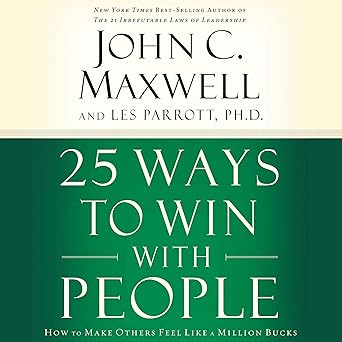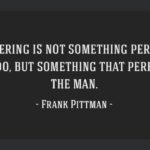1: Start With Yourself
– You can’t give what you don’t have.
– Accept yourself as you are (God’s child), not trying to become what you are not.
Identify your insecurities and their source then hold them up to the truth.
What have these insecurities held me back from? Are there any opportunities I can still seize?
– “Increase your value to others by solving as many of your problems as you can.”
Identify areas you need to improve in order to be more valuable to others and develop a plan to accomplish them.
2: The 30 Second Rule
– Within the first 30 seconds of a conversation, say something encouraging to a person.
– To be successful at this, you have to plan to do it.
– People need attention, affirmation, and appreciation to be motivated to do what is good and right
– Upon doing this regularly, people will light up when you simply walk into the room.
– Praising the good things in a person increasingly draws them out of that person.
Implementing this habit:
– Open up my calendar. Who are the people I will be meeting this week?
What can I say to them that will encourage them? What have they done for me? What have they done that is worthy of praise? Are they discouraged in any way?
– Rehearse what I will say to them.
3: Let People Know You Need Them
– People need to be needed. They need to know they helped at a meaningful level.
You may have to connect the dots for them.
– “Who specifically can help me do a better job than I can do alone?”
– “Who is just waiting to be asked to join in what I am doing?”
Implementing this habit:
– Scan your calendar for events where you can let people know that you need them
– Identify areas where you need help (either due to time or due to ability)
– List the people who are involved in the same activities, and for each person, identify any strengths that are being under-utilised.
4: Create a Memory and Revisit It Often
– Revisit existing memories with people
– Plan experiences to commemorate milestones and create mementos.
Implementing this habit:
– Who do I want to encourage and/or connect better with (people who work with me, people who work for me, my spouse)? Are there any upcoming events that I can use to create a memory?
– What are some mile stones coming up that I can create an experience or a memento for?
– What are some everyday things that I can turn into a memorable occasion?
– What are some existing memories that I can revisit with someone?
5: Compliment People In Front Of Other People
– When you compliment someone’s attitudes you can reinforce that attitude and make it more consistent.
– Find/create opportunities to do so.
– “Who can I spotlight in front of others?”
6: Give Others a Reputation to Uphold
– Have a high opinion of people (Eg. Linda Eggers “represents me well”, John Hull is “Mr. Relationship”).
– Back your high opinion up with action; give them responsibility and its associated privileges.
– “Elite performers usually need 10 years of dedicated and consistent practice before they obtain any recognizable level off excellence,” but this can be cut dramatically if the performer sees that they are forming a recognizable reputation.
– Start by asking “What is special/unique about this person?”
– Most people have given themselves at least one negative name, or have accepted one from others. This will hinder them. Re-enforcing a positive reputation will give them something to live up to.
Implementing this habit:
– For each organization where you are a leader, list all the people you lead. For each person list all theirs strengths and identify a strength that is unique among within that organization. Find a short phrase that captures that strength and start using it around them and about them.
7: Say the Right Words at the Right Time
– Forget about what you want to say and ask yourself what you would like to hear if you were in the other’s shoes.
8: Encourage the Dreams of Others
– Ask others to share their dreams with you
– Affirm the person as well as the dream
– Ask about the challenges they must overcome to reach their dreams (This helps them solidify the steps they need to take to get there. Most people aren’t good at this.)
– Offer your assistance
– Regularly revisit their dream with them
– Return to Step 1
9: Pass the Credit on to Others
– John Wooden, UCLA coach, taught his players when they scored a point to smile, wink, or nod at the player who gave them the pass.
– Verbal praise in front of others is powerful, but written praise lasts.
– Passing on credit changes the recipient’s brain chemistry and creates “and emotional stamp that forever associates you in their minds with their success.”
– Ask yourself, “who has made me more successful than I would have been on my own?” Then pass on the credit.
10: Offer Your Very Best
– Give beyond what is required of you.
11: Share a Secret With Someone
– It makes the other feel special and valued and connected to you.
– Let them know you are sharing it only because you trust them.
12: Mine the Gold of Good Intentions
– Being suspicious of others causes me to behave differently toward them, and it makes interacting with them worse.
– People generally give you what you expect from them.
13: Keep Your Eyes Off the Mirror
– Serving others from a place of emotional health is a source of contentment.
– “What are the needs of those closest to me that I could fill?” (Wife, family, friends, ministry, church, further out.)
14: Do For Others What They Can’t Do For Themselves
– “The more I give away, the more I seem to get to give away.”
1. Introduce others to people they can’t know on their own.
2. Take others to places they can’t go on their own.
3. Offer others opportunities they can’t reach on their own.
4. Share ideas with others they don’t possess on their own.
– Self determination theory: helping others reach their goals cements the relationship
– What do I have to share? Who could benefit from it?
15: Listen With Your Heart
– Roadblocks to effective listening:
Distractions
Defensiveness / close-mindedness
Projection / assumptions
Unforgiveness
– When someone feels I am understanding them, they will be more interested in understanding me, so don’t focus on getting your own point across.
Implementing this habit:
– Is there anyone who I don’t get along with or would like a deeper relationship with?
– Take a week for each of these questions and ask them every day:
Did I pay attention today?
Did I show I was listening today?
Did I seek to understand today?
Did I respond honestly and appropriately today?
Did I ask questions today?
16: Find the Keys to Their Hearts
– What do they dream about, cry about, find joy in, value, believe to be their strengths?
– Establish common ground.
– “Turn the key only when you can add value to that person.”
17: Be the First to Help
– A good question to ask is “How can I best serve this person?”
18: Add Value to People
– Learn to value people
– Learn what those closest to you value from you the most and deliver
19: Remember a Person’s Story
– The time taken in asking for and listening to someone’s story:
1. will be entirely focussed on them: their dreams, disappointments, interests, etc..
2. will be enjoyed by that person
3. will give you insight into that person
4. will build a stronger relationship
– If asking these types of questions is awkward for you, start practicing on people you’re not likely to see again, like cab drivers, waitresses, people in line.
– Don’t interrupt: replace “That reminds me of…” with “Go on” or “I see”
– Repeat back what you heard, “Let me see if I understand…”
– Bring up some aspect of the person’s story the next time you see him.
Implementing this habit:
– Every day for a month, answer this question in your journal: “Did I interject my own anecdotes or opinion into someone else’s story today?”
– Every day for a month, answer this question in your journal: “Who will I talk to today who I can ask for a story? Did I ask anyone for their story yesterday?”
20: Tell a Good Story
– Tell us a story rather than just relaying the facts.
– The goal is connecting and sharing yourself, not just making yourself look good.
Implementing this habit:
– Ask “How did I convey facts today that I could have shared as a story?”
– Ask “Did I tell stories today to make me look good rather than to better others?”
21: Give With No Strings Attached
– I would not be where I am if others had not given freely to me; others need me to do the same for them.
22: Remember Your Mailman’s Name
S – Say the name 3 times in a convesation
A – Ask a question about the name (eg. spelling) or person
V – Visualize the person’s prominent physical or personality feature
E – End the conversation with the name
– A person’s mood and self evaluation improve when another remembers him personally.
23: Point Out People’s Strengths
– Every person has some ability they are good at (they are at least 1 in 10,000).
– People are more highly motivated when working in an area of strength
– People form an identity either out of their strengths or their weaknesses. Pointing out their strengths promotes the former, which in turn will make them more effective.
24: Write Notes of Encouragement
– Take the time to handwrite personal notes on a regular basis.
– A handwritten note is evidence of your investment in that person.
– Written notes can have a long lasting effect; longer than an email.
25: Help People Win
– When you help somebody win, you will be that person’s friend for life.
– Focus on the process, not just on the win. Don’t just hand him the win, help him win so next time maybe he can win on his own.
Amazon #ads





